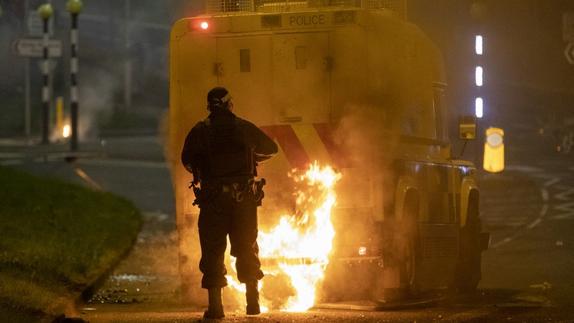 A police officer walks behind a police vehicle with flames leaping up the rear after violence broke out in Newtownabbey, north of Belfast, in Northern Ireland on April 3, 2021. (PAUL FAITH / AFP)
A police officer walks behind a police vehicle with flames leaping up the rear after violence broke out in Newtownabbey, north of Belfast, in Northern Ireland on April 3, 2021. (PAUL FAITH / AFP)
The people of Northern Ireland must not let their communities slip back to the dysfunctional recent past when they were plagued by sectarian violence, lawmakers and community leaders say.
The sectarian discord, which became known as the Troubles and claimed around 3,700 lives, flared up in the late 1960s and continued for 30 years before effectively ending on April 10, 1998, with the signing of the Good Friday Agreement.
The violence pitted pro-British Protestants against anti-British Catholics.
During the Troubles pro-British elements that wanted Northern Ireland to remain part of the United Kingdom were at loggerheads with anti-British elements that wanted it to break away and form part of a united Ireland with the Republic of Ireland to the south.
The pro-British elements became known as loyalists while the separatists became known as republicans.
After a recent reemergence of sectarian tension following more than two decades of relative calm, Irish Prime Minister Micheal Martin urged disgruntled people in Northern Ireland not to "spiral back to that dark place of sectarian murders and political discord".
Martin said, on the 23rd anniversary of the signing of the Good Friday Agreement, that the power-sharing deal that led to a soft border on the island of Ireland, and other compromises and reconciliation, must be protected. "Perhaps its most visible success is that a whole generation of young people have grown up not knowing or experiencing the violence that accompanied the Troubles," ITV News quoted him as saying.
Martin said people today owe it to future generations to maintain the peace.
"There is now a particular onus on those of us who currently hold the responsibility of political leadership to step forward and play our part and ensure that this cannot happen," he said. "I am determined to work with the British government, the (devolved government in Northern Ireland), and all political parties to protect the Good Friday Agreement, in all its parts."
The sectarian discord, which became known as the Troubles and claimed around 3,700 lives, flared up in the late 1960s and continued for 30 years before effectively ending on April 10, 1998, with the signing of the Good Friday Agreement
ALSO READ: N. Ireland spat may spoil peace deal
As Martin and others stress the need for cooperation, the European Union's Brexit commissioner Maros Sefcovic and his UK counterpart David Frost may meet this week to review the progress on the post-Brexit trade rules, the Financial Times reported. The two sides are making progress in talks on how to apply the trade rules in Northern Ireland.
Political spectrum
Others voices across the political spectrum called for people not to lose sight of the gains.
Michelle O'Neill, the vice-president of Sinn Fein, a political party that represents many republicans, tweeted: "Twenty-three years on from the signing of the Good Friday Agreement we must deliver on the promises of 1998 to a new generation of our young people."
READ MORE: EU envoy to UK: N. Ireland protocol is solution, not problem
Claire Sugden, an independent lawmaker who represents people in a loyalist community that has been hit by unrest directed toward the police in recent days, attempted to downplay the violence by claiming it was "nothing more than anti-social behavior and attention-seeking".
The BBC said 88 police officers had been injured as of Sunday in around two weeks of violence and disorder in loyalist areas, where youths have thrown petrol bombs and stones at police and set vehicles on fire.
The Police Service of Northern Ireland confirmed most of the rioters have been young people, and called on "parents, guardians and community leaders to use their influence" to bring the young people under control.
Agencies contributed to this story.


